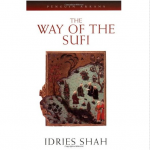When I was an undergrad I took a South East Asian music and culture class to fulfill a humanities requirement. It turned out to be a hidden gem full of great writings. One of the lessons that really struck me was the study of Sufism. The praise of happiness and music as strengthening one’s spirituality really flowed for me as a genuine belief of nurturing the soul. It was just a brief part of the course, but it touched me enough to want to seek out more information.
Last year I bought the book, “The way of the Sufi” by Idries Shah, it is wonderfully well-written. Many gifted teachers and mystics have contributed to the writings and lessons of Sufism for hundreds of years, and so instead of generalizing their teachings together, Shah has divided much of his book into bios of these spiritual philosophers, followed by their individual contributions. I strongly recommend it as both a learning tool and an eloquently written history book.
The following is Idries Shah’s bio from the beginning of the book:
“Idries Shah devoted much of his life to bringing the West a clearer understanding of Sufism. Born in 1924 into a family that traces itself through the Prophet Mohammed and the Sassanian Emperors of Persia, and beyond that, back to 122 B.C. – perhaps the oldest recorded lineage on earth. Shah was the author of many books. He wrote on subjects as diverse as travel, bibliography, literature, humour, philosophy and history, but it was for his books on Sufi though that he was best known. Shah’s enthusiasm for cross-cultural studies led him in 1965 to establish an educational charity, the Institute for Cultural Research in London, where he became Director of Studies. He also founded the Afghan Relief organization after the Soviet invasion of Afghanistan in 1979. Idries Shah was awarded the Dictionary of International Biography’s Certificate of Merit for Distinguished Service to Human Thought. He died in 1996.”
Here are a few powerful quotes from Sufi writings:
“Every clique has a theory about me – I am mine; what I am, I am.” -Omar Khayyam
“I will not serve God like a labourer, in expectation of my wages” – Rabia el-Adawia
“Do not regret the past and do not worry about the future” – Dhun-Nun
And my two favorite:
“All wisdom can be stated in two lines:
“What is done for you – Allow it to be done. What you must do yourself – make sure you do it” -Khawwas
“If you could untie your wings and free your soul of jealousy, you and everyone around you would fly up like doves” -Rumi

